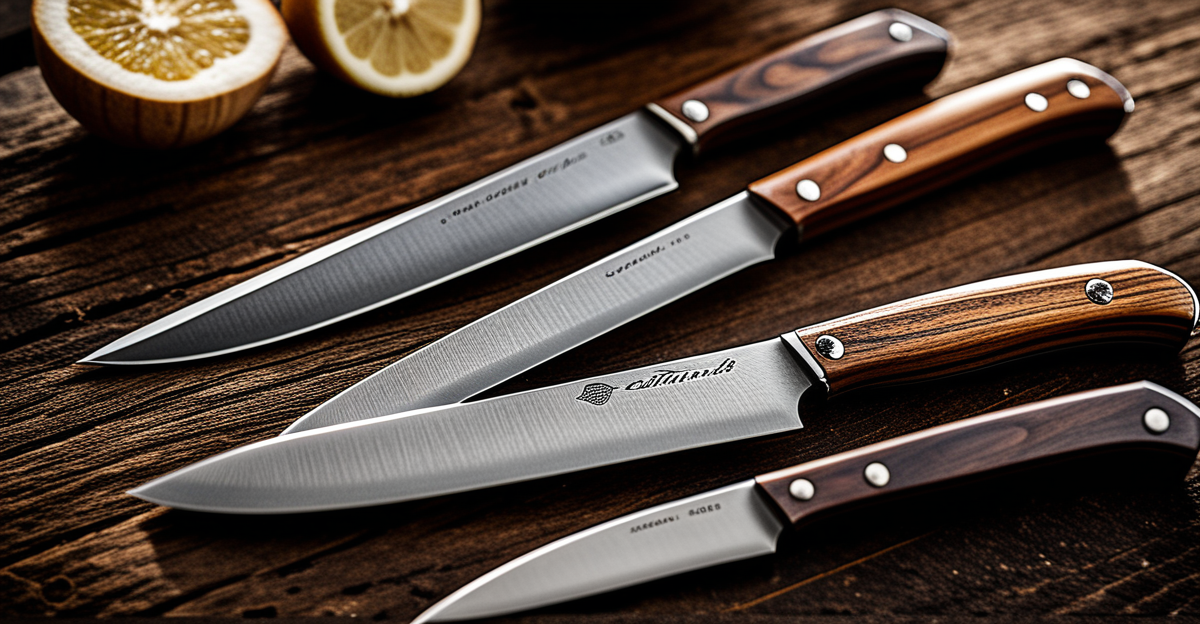Morta wood knives stand apart through rare materials and masterful craftsmanship. Each blade blends timeless artistry with rugged durability, offering a unique tool shaped by tradition and innovation. Discover how these handcrafted knives transform everyday use into an extraordinary experience, combining natural beauty with precision performance.
Discovering Artisanal Cutlery: Unveiling Uniquely Crafted Morta Wood Knives and Master Craftsmanship
Among collectors and kitchen enthusiasts, handmade Morta wood knives stand out for their fusion of heritage and artistry—Discover the full article to immerse yourself further in the details. Morta, a rare wood aged over millennia in French marshes, brings unmatched durability and distinctive texture to every knife handle, making each piece one of a kind. This ancient material not only enhances visual appeal but also connects users to a living fragment of history.
In the same genre : Discover exceptional morta wood knives and artisanal craftsmanship
Artisan knife makers create these hand-forged knives using traditional crafting methods, resulting in exceptional unique knife designs that mass-produced models simply cannot match. Whether seeking a bespoke folding, fixed, chef, or Damascus knife, customers will find remarkable attention to detail and a palpable sense of ownership in every blade.
Compared to factory alternatives, handcrafted knives offer improved balance, superior edge retention, and high-quality cutting tools tailored precisely to individual preferences. The intricate variation in wooden knife handles or bespoke steel types—like layered Damascus—means each knife tells a story, transforming everyday culinary tasks into memorable experiences for professional chefs and passionate home cooks alike.
This might interest you : Unlock the secrets of flavor balance: essential tips for creating classic shepherd”s pie
Inside the Craft: Techniques, Materials, and Distinguishing Characteristics
Morta wood: Heritage, rarity, and sustainable knife making
Precision: Morta wood, a fossilized oak from ancient French peat bogs, is harvested after thousands of years underground, yielding a rare, eco-friendly material. Its hard, resilient nature after millennia of preservation sets it apart among wooden knife handles. The wood’s heritage and durability not only enhance longevity but reinforce environmentally conscious choices in knife making craftsmanship. Strictly managed extraction ensures minimal impact on local ecosystems, making Morta a reference point for sustainable knife crafting.
Blade craftsmanship: Steel types, forging techniques, and signature designs
Most Morta knives feature hand-forged blades from high-performance steels, such as Damascus steel and traditional carbon or stainless steel. Damascus blades, recognized for their layered, undulating patterns, embody both beauty and performance. Artisans employ age-old forging and premium blade finishing techniques—repeated folding, heat treatments, and edge sharpening—to maximize sharpness, toughness, and corrosion resistance. These methods result in unique knife designs that blend historic artistry with modern function.
Handle materials and comfort: Wooden handles, ergonomics, and aesthetic choices
The selection of knife handle materials prioritizes both comfort and style. Morta wood’s density assures comfortable knife grips and natural moisture resistance. Attention to ergonomic knife design ensures each knife fits securely in hand, supporting seamless culinary or collection experiences. Artisans sometimes combine Morta with fossilized mammoth ivory, deepening the tactile and visual appeal, and making each piece truly one-of-a-kind.
Choosing, Buying, and Caring for Artisanal Cutlery
How to select the right handmade knife: key considerations for buyers
Identify your main use first—kitchen, outdoor, collection, or gifting—to narrow down designs and blade types. For cooking, consider hand-forged chef or utility knives. Those drawn to collecting may prioritize unique handle materials like Morta wood or striking Damascus steel patterns. Assess handle comfort and grip, especially for longer use in a professional kitchen. Important traits include blade hardness, edge retention, and precise balance, as these influence longevity and safety. Always take note of the creator’s craftsmanship; small-batch and custom knife orders deliver more exclusivity and character.
Online buying guide: where to find and purchase authentic Morta wood and artisan knives
Authentic artisan knives, especially those with regional materials like Morta wood, are often available via dedicated artisan workshops or specialty websites. Look for makers who clearly state traditional methods, sustainable sourcing, and small-batch knife production. Trust platforms providing transparent details about knife origin, design collaborations, and steel types. Limited editions and bespoke cutlery collections cater to anyone seeking memorable gift ideas for chefs or knife enthusiasts, often providing custom engraving options and rare handle woods.
Maintenance tips: care routines, sharpening tools, and preserving heirloom-quality cutlery
Hand wash and dry knives immediately to avoid corrosion—dishwashers can damage wood handles and blades. Use sharpening stones and honing rods suited for the knife’s steel; regular honing keeps the edge aligned, while sharpening restores dullness. Store in sheaths or on magnetic strips away from humidity. Proper care ensures heirloom knives, such as those crafted from historic woods, retain both function and beauty.






